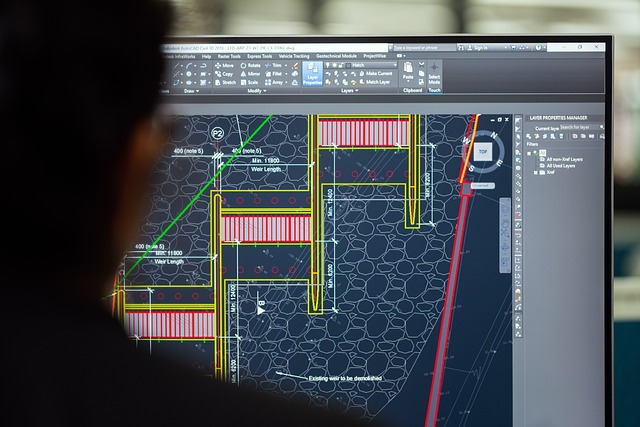Careers in civil engineering are wide-ranging, allowing you to choose a specialization. Civil engineers work both on-site and off-site helping to make sure that every stage of the project, from pitch to completion, runs smoothly and produces excellent results.
The process of becoming a civil engineer isn’t extensive but it does require at least a Bachelor’s Degree in Civil Engineering or a specific type of civil engineering if you want to specialize in a certain field.
There are specific skills you’ll need for a career in civil engineering, and you’ll need to attend a university and get on-site experience as you begin to apply your knowledge to real engineering projects.
In this article, we’ll discuss all the different steps to becoming a civil engineer.
What is Civil Engineering?
Civil engineering is a field of engineering that handles the design, construction, and maintenance of structures built for public use.
Civil engineers can work in either the public or private sector, building infrastructures like dams, roads, bridges, pipelines, airports, stadiums, and railways. Their projects are either funded privately or by the government and can vary in style, size, and function.
Civil engineers can work off-site or behind the scenes, designing and planning projects by researching and analyzing scientific and engineering principles to ensure the security and durability of the structure.
However, they can also work on-site by surveying or mapping the landscape before the project begins or overseeing the construction process to make sure everything is running smoothly.
Civil engineers can use drones, scanners, or LiDAR technology to carry out investigations or risk assessments at sites that are being considered for projects.
This can give them high-quality, detailed maps that can give them a better idea of the type of terrain or nearby natural resources like rivers, lakes, or oceans, which can be helpful when planning the project and when the work actually starts.
Civil engineering is an industry that has lots of subdivisions for engineers to specialize in:
- Municipal and Urban Engineering
- Transportation Engineering
- Construction Engineering
- Structural Engineering
- Earthquake Engineering
- Coastal Engineering
- Geotechnical Engineering
- Water Resources Engineering
Each of these sectors has its own subcategories also, allowing you to pick a specialty and become an expert in a field that suits your interests.
How to Become a Civil Engineer
There are several steps you’ll need to follow to become an engineer. Depending on whether you’d prefer to choose a specialization right away or start your career as a generalized civil engineer, there are different ways of entering the industry, and they all begin with schooling.
First, you need to identify what you have a passion for and you have to have the desire to plan and construct infrastructure that can have a positive effect on humans and the environment.
Ideally, if you’ve identified civil engineering as a career path, you’ll need to choose the appropriate subjects at school. Some subjects you should focus on are physics, math, chemistry, biology, geography, and design.
Develop the Skills Necessary
Doing your own research on civil engineering, science, technology, and the environment can be a great starting point to identify whether the civil engineering career path is a good fit for you.
Getting a strong foundation of knowledge in engineering science and technology will be crucial if you decide to follow through with becoming a civil engineer. Science and technology are the foundations of civil engineering and will be used in every stage of the construction process.
Any general knowledge about building and construction will also be vital if the civil engineering route is for you. Learning about how construction companies work, the stages of construction, and builders’ priorities can all help you to become a great civil engineer.
Design skills are also important and any artistic capabilities you have would be well put to use in this field. This, combined with general thinking, reasoning, problem-solving, and analytical thinking skills will all help you to perform your civil engineering job successfully.
Get a Bachelor’s Degree in Civil Engineering
Getting a Bachelor’s Degree in Civil Engineering is the next step you’ll have to take. Your degree should specifically be in civil engineering, but you can also dabble in specialized subject areas.
Although civil engineers are in demand, the industry is still competitive. If possible, choose a degree program at one of the leading universities in the civil engineering field. Massachusetts Institute of Technology is renowned for producing top-quality engineers, but there are plenty of options available depending on your location or extracurricular and social preferences.
Simple online searches will give you plenty of information about university rankings and costs, so be sure to do your research. Sites like the U.S. News provide annual university rankings based on specific subjects, which will give you a good idea of how certain universities are performing in particular areas.
Attending a top-rate university will help boost your employability and ensure you’re fully equipped to work as a civil engineer.
Many undergraduate degrees in civil engineering fall under the civil and environmental engineering category. Not only does this illustrate the significant impacts that environmental projects have on civil engineering work, but it can be helpful to know that universities are interested in applicants who are eager to work in environmental protection.
Although it’s not necessary, any environmental-related projects or sustainability work you’ve achieved, even if it’s unrelated to civil engineering, may help you to get into your chosen university.
 via Pixabay
via Pixabay
Find a Civil Engineering Internship
Because of the hands-on nature of a career in civil engineering, work experience is crucial and will significantly contribute positively to how employers view your skills.
Summer internships and apprenticeships are useful and will help bolster your application when it comes to applying for jobs. These can be done while you’re still in school and are great ways to spend the summer.
Engineering firms commonly offer internships for students or recent graduates who don’t have very much experience, so opportunities should be fairly frequent.
Some universities recognize the hands-on nature of the civil engineering industry and offer placement roles with partnered firms as part of their programs. Taking advantage of these partnerships is a great way to make sure that you’re getting the best experience, but finding any additional experience yourself is even more impressive.
This shows employers that you’re dedicated and hard-working, and don’t wait for organizations or institutions to provide opportunities for you.
The experience you’ll get during summer internships or apprenticeships is highly valuable to anyone who is considering becoming a civil engineer. Be sure to take every opportunity possible. The more experience the better!
Joining relevant engineering organizations can also help with networking and sometimes provide opportunities you can’t get through a university. Not only will this help you make contacts in the engineering field, but it may help you get a foot in the door with some great companies.
Joining an engineering organization, especially one specializing in civil or environmental engineering, will demonstrate your interest and determination and is appealing to any employer.
Choose What Civil Engineering Discipline You’ll Specialize In
There is a broad range of options available to you as a civil engineer. The subcategories are extensive and some are even further categorized into smaller niches, so you’ll have plenty of opportunities to help you find the jobs that are the best fit for you.
For example, as a civil engineering graduate, you might choose to specialize in environmental engineering and then you can either stick with jobs as a general environmental engineer or choose to specify further into one of these areas:
- Coastal Engineering
- Geophysical Engineering
- Ocean Engineering
- Ecological Engineering
- Water Resources Engineering
- Solid Waste Engineering
- Environmental Chemodynamics
- Groundwater Hydrology
There are more subcategories in each type of civil engineering so there’s something for everyone.

via Pixabay
Get Your Professional License and a Higher Graduate Degree
Consider furthering your education by earning a master’s degree or doctorate to help you learn more information about the field. Some schools offer a dual degree program that extends your schooling to five years, but you’ll have a master’s and a bachelor’s at the end of that time.
While you’re getting a higher education, you should consider choosing a specialty so you can prove that you have the most complete civil engineering knowledge and experience for basic roles, but have the skills, specialized knowledge, and experience needed for management jobs.
This can help to increase your employability and gives you more freedom to apply to varying roles. You can also specialize and earn other professional qualifications, depending on what area of civil engineering appeals to you.
Attaining a chartered engineer status can increase your attractiveness to employers and help you earn better pay and opportunities for better jobs in the civil engineering field.
Get an Entry-Level Job
After graduation, the next step is to find an entry-level civil engineering job. Depending on your location, chosen company, previous education, and job duties, these can provide a starting salary of up to $80,000 per year.
Large private sector companies have frequent graduate internships available for civil engineers, but other firms can offer you permanent roles right away.
Final Thoughts
Civil engineering is a great industry to join. The work produced provides quality structures for our benefit and can make a real difference in the way our world functions. Follow the steps we’ve outlined in our blog post to kickstart your civil engineering career.
For more information about entering the civil engineering industry, visit Fenstermaker’s engineering service page.






